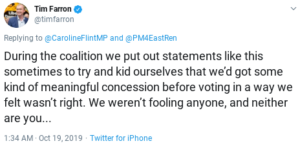I originally wrote this in mid-August, and although politics has come at us fast over the following couple of months, I feel like this is still relevant.
It’s funny how politics can burn you. It’s not that long ago that I remember thinking of the Liberal Democrats as a potential force for progress and positive change in the UK. Call me naive, because when it came to electoral and party politics, I certainly was.
Before 2010 the Lib Dems had long pushed for voting reform and abolition of First Past the Post. I welcomed it. Such reform, I believed, would undermine what I saw as a contemptible convergence between Blairite Labour and Cameronian Toryism, each squabbling over the swing voter demographic of whatever middle England was imagined to be, proposing similar policies and twitching the curtain of the Overton window as they scapegoated the nebulous figure of ‘the immigrant’. Anything but more Blairism, I thought, but never the Tories.
The Lib Dems also took a stand over tuition fees for university students, saying they should be abolished. Tuition fees had only grown since my time at university, where I was lucky enough to pay only £1,000 a year. I had a stark memory of a favourite seminar tutor, an American academic studying for his PhD, telling me he was almost £100,000 in debt already. Who would want to reproduce such a repugnant state of affairs? A firm stance against fees, the main cause of such debts, seemed noble, admirable, and simply right.
I also had memories of Charles Kennedy being the one major party leader back in 2003 who had vocally opposed the invasion of Iraq. Come 2010 Kennedy was no longer the party leader, of course, but if a party’s leader had taken such a prominent anti-war stance in the face of support across the British media and political landscape, surely the party itself must be characterised by being anti-war?
You might be forgiven for thinking this, if you didn’t look closely.
Like many who might have felt politically engaged but had little knowledge of actually-existing electoral politics, I imagined that the Liberal Democrats represented an alternative to New Labour and Cameron’s rebranded Tories. When Clegg outperformed the other party leaders in televised debate (thanks to the cunning tactic of remembering a few peoples’ names for up to two minutes), I even allowed myself to imagine a Lib Dem surge that would put New Labour out of power but prevent the Tories seizing the reins!
We know how the 2010 election played out. The Liberal Democrats acted as kingmakers and went into coalition with the Tories. Sometimes it was claimed they would blunt the worst excesses of Tory nastiness, and it’s true that the Tories after the coalition went deeper and further – but this built on top of the extensive, immiserating, and cruel austerity cuts they had already implemented. The widespread contempt for the Lib Dem coalition period is perhaps best represented by a well-known tweet in which a Lib Dem special advisor retrospectively celebrates the months of effort pushing for a plastic bag charge in return for tightening benefit sanctions.

Notably the party’s total reversal over tuition fees – a shift from abolition of fees to tripling them – enraged students and led to mass protests toward the end of 2010. Although the protests failed to produce any change in tuition fee policy, I believe these experiences – for a whole generation of students and young people – of betrayal for political expedience, of mass organisation and action, of heavy-handed policing and condemnatory media narratives, were significant factors in the undermining of centrist political narratives and of the future Corbynist surge.
Certainly it didn’t do popular support for the Liberal Democrats any favours. Although they spent five years sharing power with the Tories, come the next election they plummeted from 57 seats in Parliament to eight.
Update: in an odd mixture of surprising candor and – probably – desire to move on from the party’s record during the coalition era, Tim Farron tweeted this out in mid-October this year:

In the subsequent period in the wilderness, Clegg passed leadership to Tim Farron, who is perhaps best remembered as something of a joke: a deeply awkward man who failed to refute accusations of latent homophobia. My notes here simply read “discuss the tenure of gay frog milk man“. The Lib Dems regained only a few seats in 2017’s snap election, with Farron’s gambit of positioning them as “the Remain party” falling short against Labour and Tory strategies. What more need really be said?
Now we have Jo Swinson. A leader stepping forward at a time when Brexit dominates the British political landscape more than ever before, she appeared to have doubled down on Farron’s strategy. The Liberal Democrats were the ultra-Remain party. Under her leadership nothing else mattered more than stopping Brexit.
A scant few weeks later, her party rejected efforts from Labour to establish a second referendum with Remain on the ballot. So… was this proposal somehow not good enough? Will only the fantasy of cancelling Brexit suffice? Is this simply because they hate the idea of Prime Minister Corbyn so much? Is Swinson, whisper it, accepting the inevitability of Brexit? Rather than attempting to moderate the damage of the politically inevitable and move on (which seems clearly, to me, to have always been what lay behind Labour policy on the matter), is she positioning the party to benefit from being martyr figures when a no-deal Brexit proves ruinous?
One can only speculate. But the moment made me recall, back in 2015, watching the situation in Greece unfold. Syriza had just capitulated to the EU troika despite the ‘Oxi’ referendum result. I asked myself and my friends on Facebook: if they can’t do this, what are Syriza even for?
Now I ask the same of the Liberal Democrats. Having burned their progressive credentials in the cold fires of austerity government, by demonstrating themselves to be so free of principal that they will drop core policies, and by actively working against the only realistic counter-Brexit strategies still on the table, I have to ask their members and supporters: what do you imagine they are for?

